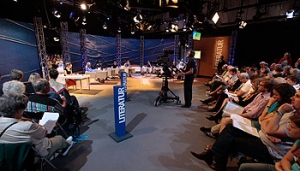 Juror Burkhard Spinnen (Bild: Johannes Puch)
Juror Burkhard Spinnen (Bild: Johannes Puch)
Day one: no favourite, lots of praise for Elmiger
Five authors read on the first day of reading of the Festival of German-Language Literature. While the first three did not pass the criticism, the final text of the day was discussed very generously.
Not much enthusiasm for “Katzenberge”
The first text of the day, “Katzenberge” by Sabrina Janesch, tells the story of the relocation of Ukrainian peasants from Galicia to Silesia: the Russians take 13 men against their will to foreign lands were they have to settle in the abandoned farms of the Germans. The text received an invitation at the suggestion of Alain Claude Sulzer. The verdicts of his colleagues were not very enthusiastic and ranged from “a harmless story” (Hubert Winkels) and “too well-behaved” (Karin Fleischanderl) to “unfortunately somewhat bland”.
Sulzer tried to appease things, but without much feedback from his colleagues.
Jury discussion Sabrina Janesch
Altwasser: Too much unintentional humour
Volker H. Altwasser was the second author of the morning of readings at Klagenfurt’s ORF Theatre. His text “Letzte Fischer” is about the slow death of deep sea fishing and the dilemmas of a “young and ambitious man”. His text – proposed by Meike Feßmann – also largely failed with the jury, although some of the comments voiced respect for Altwasser’s “bizarre day-to-day occurrence”. Nonetheless: too much “unintentional humour” in the text, which sometimes slipped off into the psychological: “a book for juveniles” (Paul Jandl).
Jury discussion Volker H. Altwasser
Unusual father-son relationship not well received
Christopher Kloeble was the last author to read on the first morning of the readings. His novel extract “Ein versteckter Mensch” deals with an unusual father-son relationship, but perhaps for the same reason it was “too awkward” in places for the jury. Jury chairman Burkhard Spinnen even said: “I have the feeling that the characters are fighting against what the author is planning to do with them.” The jury complained about “wrong images” and “a lack of sensitivity”, and Paul Jandl even thought that the text “immunises itself” against criticism with its own “logic of dementia”.
Jury discussion Christopher Kloeble
“Depressive moods” after Mezger’s text
The afternoon continued with Daniel Mezger, who came to Klagenfurt on Burkhard Spinnen’s invitation. Swiss Mezger read from his novel “Bleib am Leben”. The jury did not agree about this plea of a village teacher who leaves his wife and keeps begging her not to kill herself, “to stay alive”. Some of the jury members even felt that the story in the form of a monologue put them in a “depressive mood” (Sulzer). And: “After three pages you know what it’s about.”
 Bachmannstudio im ORF (Bild: Johannes Puch)
Bachmannstudio im ORF (Bild: Johannes Puch)
Plenty of good will for Elmiger
The final author of the day was Dorothee Elmiger, also from Switzerland. With her text “Einladung an die Waghalsigen”, the first five hours of the Bachmann Prize came to a promising and “positive conclusion”, as presenter Clarissa Stadler noted. “Original and very cleverly executed prose for such a young author” (Feßmann), “very playful, also in content” (Winkels) – only Alain Claude Sulzer was perplexed: “I am glad that the text was explained to me.”
Jury discussion Dorothee Elmiger